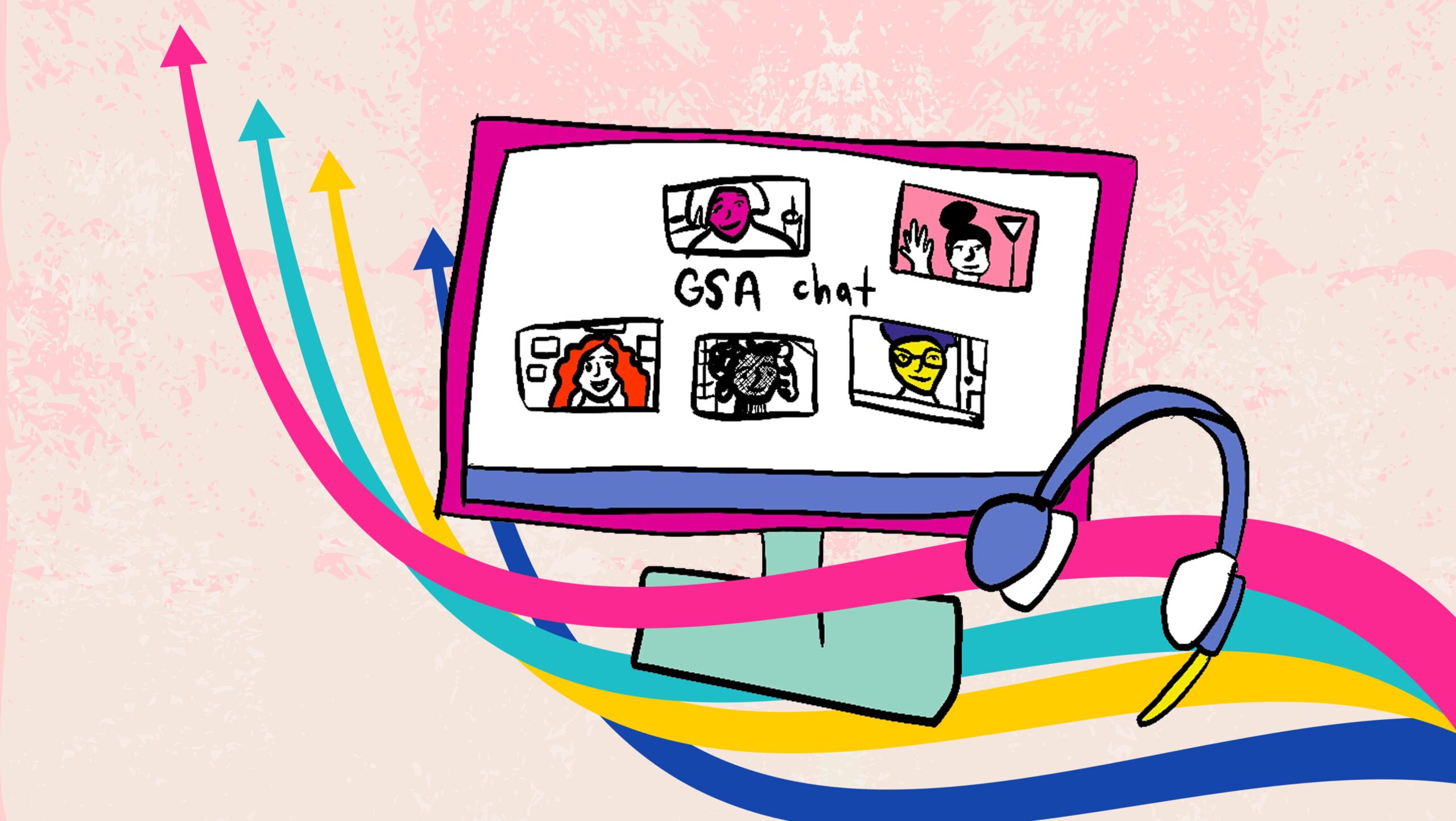This story is part of Your Communities In Action, a continuing series on LGBTQ2 folks coping and caring for each other during the COVID-19 crisis.
Last Tuesday afternoon, 16 students, staff and alumni from Strathcona-Tweedsmuir School in Okotoks, Alberta, logged onto a Zoom call. It’s been weeks since the group gathered in person—before the COVID-19 pandemic closed Alberta schools indefinitely, before physical distancing measures came into effect across the province. But from behind their screens, they follow the same ritual as they did before the novel coronavirus turned the world upside down: Around they go, stating their names and their pronouns, musing on the ups and downs of isolation. Then a special guest joins, an alumnus of the school who is now out and directing films. It’s not what their lunch-hour Gender and Sexuality Awareness (GSA) group meeting usually looks like—but for now, it works.
Across Alberta, teachers and faculty are finding new ways to engage with their LGBTQ2 students, and virtual GSAs (best known as Gay-Straight Alliances, but also now include more queer- and trans-inclusive names) are becoming more commonplace. And for queer and trans youth who aren’t out at home, who don’t have supportive families or for whom their school’s GSA is their only safe space, continuing the meetings online can be life-saving.
Hilary Mutch, the LGBTQ2S+ community development coordinator at Alberta’s Centre for Sexuality, works closely with GSAs in southern Alberta. She says many have opted for online meetings, chatrooms and social media engagement as a means of staying connected. That’s especially important for youth from rural communities or places where queer- and trans-affirming community centres don’t exist, Mutch says. “[In those places], a GSA is the primary source of support,” she says. “If you take the in-person connection away, it’s so important to supplement it with something else.”
For years, GSAs have been considered integral safe spaces for LGBTQ2 students in Canadian schools. Even as attitudes toward queer and trans folks improve in Canada, LGBTQ2 youth are still at a higher risk of suicide, substance abuse and isolation than their straight and cis counterparts, and many regularly hear anti-gay and anti-trans slurs at school. GSAs provide support through meetings and, just as critically, their presence provides a sense of solidarity and possibility among students who aren’t out.
Despite their importance, protections for GSAs are fragile in Alberta. In 2015, Rachel Notley’s NDP government passed legislation to ensure all GSAs could exist should a student request one; in 2017, the government passed another bill affirming that the privacy of students who joined the groups was protected. But four years after the original protections passed, Premier Jason Kenney, during his election campaign, threatened to repeal the legislation that protected students’ privacy.
The GSA at Strathcona-Tweedsmuir School, a K-12 private school just south of Calgary, was formed in 2015 by student request. Emily Fraser, a teacher at the school, took the lead in establishing the group. That first meeting, she says, proved the need for its existence: About 20 kids showed up. Since then, anywhere from 10 to 30 students meet every Tuesday during lunch to rant and rave about their favourite queer TV shows, discuss ways to engage their school in LGBTQ2-affirming activities and hear a guest speaker talk about their own coming out experiences.
View this post on Instagram
A post shared by STS GSA (@stsgsa) on
Then, on Mar. 16, the school closed due to the COVID-19 pandemic. By that point, students had already been out of school for two weeks on spring break, and a return for the remainder of the school year looked bleak. Fraser was worried. “Schools are a safe space no matter how you identify,” she says. She wondered: How would students who relied on their GSA for safety and support manage during the pandemic? How could she reach kids who weren’t out outside of the school?
Fraser sprung to action, polling students via Google Form to see what kinds of support, if any, they’d like while in isolation. They responded overwhelmingly in favour of Zoom calls and an online chat where they can duck in and out of conversation as they need it. Last week marked the implementation of those online supports, and so far, Fraser says her students have been fairly active, sharing photos of their pets on the group chat and showing up for their typical Tuesday GSA meeting.
“[The GSA is] a place to be heard, and to hear other’s stories,” one Strathcona-Tweedsmuir student says (their name is not being used to protect their privacy). “It’s one of the few spaces where you don’t need to worry about being judged for who you are. In the midst of this pandemic, it’s truly wonderful that we still have the GSA online.”
Fraser says the goal of the virtual meetings is to provide a safe and comfortable outlet for students, a place of connection. But it’s not lost on her how much the school’s GSA is losing from a lack of in-person meetings. The older cohort of students, from Grades 7 to 12, had shifted the GSA’s focus toward advocacy, hoping to provide workshops for teachers about LGBTQ2 inclusivity in the school; those workshops are now on hold. Meanwhile, the elementary-aged students who had requested their own GSA at Strathcona-Tweedsmuir are left waiting—plans to create a separate group geared toward their age group have been thwarted by the pandemic. When that GSA will begin depends on when students can return to school safely.
View this post on Instagram
A post shared by Centre for Sexuality (@yycsexualhealth) on
And, Mutch adds, those online meeting spaces raise concerns around privacy and safety. How might a student who isn’t out to their parents, for instance, be able to safely have a video conference with their queer and trans peers? Part of Mutch’s work at the Centre for Sexuality is engaging LGBTQ2 youth in other, less overt ways. For one, she says, she’s been relying on the organization’s iPad to draw doodles she can share on Instagram—a space where kids can get support relatively privately. She’s also facilitated an “Ask Me Anything” and a play-along GSA board game on the platform.
It’s still too early to know when students might return to school. For the students at Tweedsmuir-Strathcona, that means more Zoom calls and online chats—time spent eagerly awaiting those lunch-hour meetings once again. Because, as Mutch puts it, “There’s something that can’t be replaced in that safe space of queer people coming together.”


 Why you can trust Xtra
Why you can trust Xtra


